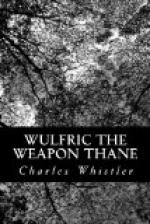We came now to a place where the trees thinned away on the brow of a hill, and I could see the broad waters of the haven through their trunks. We had reached the crest of that little cliff over which Wilfrith’s heathen had cast themselves in the great famine from which he saved them.
“Let us see the last of Bosham,” the prior said sadly. So we crept through the fern and long grass, and lying down looked out over haven and village. Even if a prying Dane looked our way he would hardly see us thus hidden, or if he did would take us but for villagers and care not.
Now I saw that the tide was on the turn, and that Halfden’s ship—my own ship, as I have ever thought her—had hauled out, and her boats waited for the last of the crew at the wharf side. But Rorik’s ship was there still, and her men were busy rigging a crane of spars as though they would lower some heavy thing on board her. Nor could I guess what that might be.
Then I looked at the village, which was burning here and there, and at the monastery. They had not fired the church, and the Danes clustered round the tower doorway, busied with something, and I could see them well, for the smoke from the burning buildings blew away from us.
Now I asked the prior what heavy things worth carrying away might be in the monastery.
“Naught,” he said; “since they have drunk all the ale that was in the cask or two we had.
“But,” he added, “there is the great bell, it is the only weighty thing else.”
Then I knew what was toward, and said:
“I fear, Father, that your bell is going to be taken to become metal for mail shirts, and axe heads, and arrowheads, and helms.”
“Holy St. Wilfrith!” cried the monk, in great grief; “would that we could have saved it. There is no such bell in all England, and if they take it, many a sailor will miss its call through fog and driving mist, and many a shepherd on yonder downs will wait for its ringing, and be the wearier for lack thereof.”
“Never have I seen bell too large for one man to handle,” I said; “this must be a wondrous bell!”
So it was, he told me, and while we watched the busy Danes, he began to sing to me in low tones the song of Bosham bell which his people would sing by the fireside.
“Hard by the haven,
Wilfrith the holy
Bade men a bell tower
Sturdily build.
Thence should a bell sound
Over the wide seas,
Homeward to hail
The hardy shipmen.
Thus was the bell wrought
By skilful workmen:
Into the fierce fire,
When it was founded,
Helm and harness
The warriors hove;
Willingly women,
The jewel wearers,
Golden and silver gauds
Gave for the melting;
And a great anchor
The seamen added.
Thus was a wealth
Of wondrous metal.
When all was molten
More grew its marvel!
Cast in a chalice,
Cuthred the priest.”
“Aye, Father,” said I, “that is a wondrous bell.”




